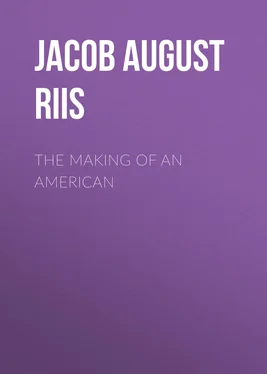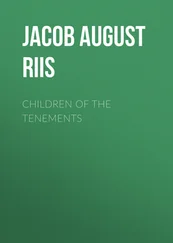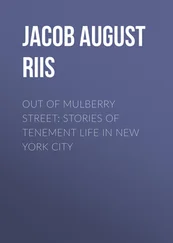Jacob August Riis - The Making of an American
Здесь есть возможность читать онлайн «Jacob August Riis - The Making of an American» — ознакомительный отрывок электронной книги совершенно бесплатно, а после прочтения отрывка купить полную версию. В некоторых случаях можно слушать аудио, скачать через торрент в формате fb2 и присутствует краткое содержание. Жанр: Биографии и Мемуары, История, foreign_edu, foreign_antique, foreign_prose, на английском языке. Описание произведения, (предисловие) а так же отзывы посетителей доступны на портале библиотеки ЛибКат.
- Название:The Making of an American
- Автор:
- Жанр:
- Год:неизвестен
- ISBN:нет данных
- Рейтинг книги:5 / 5. Голосов: 1
-
Избранное:Добавить в избранное
- Отзывы:
-
Ваша оценка:
- 100
- 1
- 2
- 3
- 4
- 5
The Making of an American: краткое содержание, описание и аннотация
Предлагаем к чтению аннотацию, описание, краткое содержание или предисловие (зависит от того, что написал сам автор книги «The Making of an American»). Если вы не нашли необходимую информацию о книге — напишите в комментариях, мы постараемся отыскать её.
The Making of an American — читать онлайн ознакомительный отрывок
Ниже представлен текст книги, разбитый по страницам. Система сохранения места последней прочитанной страницы, позволяет с удобством читать онлайн бесплатно книгу «The Making of an American», без необходимости каждый раз заново искать на чём Вы остановились. Поставьте закладку, и сможете в любой момент перейти на страницу, на которой закончили чтение.
Интервал:
Закладка:
My dog had been waiting, never taking its eyes off the door, until I should come out. When it saw me in the grasp of the doorman, it fell upon him at once, fastening its teeth in his leg. He let go of me with a yell of pain, seized the poor little beast by the legs, and beat its brains out against the stone steps.
At the sight a blind rage seized me. Raving like a madman, I stormed the police station with paving-stones from the gutter. The fury of my onset frightened even the sergeant, who saw, perhaps, that he had gone too far, and he called two policemen to disarm and conduct me out of the precinct anywhere so that he got rid of me. They marched me to the nearest ferry and turned me loose. The ferry-master halted me. I had no money, but I gave him a silk handkerchief, the last thing about me that had any value, and for that he let me cross to Jersey City. I shook the dust of New York from my feet, vowing that I would never return, and, setting my face toward the west, marched straight out the first railroad track I came to.
And now, right here, begins the part of my story that is my only excuse for writing down these facts, though it will not appear for a while yet. The outrage of that night became, in the providence of God, the means of putting an end to one of the foulest abuses that ever disgraced a Christian city, and a mainspring in the battle with the slum as far as my share in it is concerned. My dog did not die unavenged.
I walked all day, following the track, and in the afternoon crossed the long trestlework of the Jersey Central Railroad over Newark Bay, with my face set toward Philadelphia. I had friends there, distant relatives, and had at last made up my mind to go to them and ask them to start me afresh. On the road which I had chosen for myself I had come to the jumping-off place. Before night I found company in other tramps who had been over the road before and knew just what towns to go around and which to walk through boldly. Rahway, if I remember rightly, was one of those to be severely shunned. I discovered presently that I was on the great tramps' highway, with the column moving south on its autumn hegira to warmer climes. I cannot say I fancied the company. Tramps never had any attraction for me, as a sociological problem or otherwise. I was compelled, more than once, to be of and with them, but I shook their company as quickly as I could. As for the "problem" they are supposed to represent, I think the workhouse and the police are quite competent to deal with that, provided it is not a Tammany police. It does not differ appreciably from the problem of human laziness in any other shape or age. We got some light on that, which ought to convince anybody, when under Mayor Strong's administration we tried to deal intelligently with vagrancy. One-half of the homeless applicants for night shelter were fat, well-nourished young loafers who wouldn't work. That is not my statement, but the report of the doctor who saw them stripped, taking their bath. The bath and the investigation presently decreased their numbers, until in a week scarcely anything was left of the "problem" that had bothered us so.
Four days I was on the way to Philadelphia, living on apples and an occasional meal earned by doing odd jobs. At night I slept in lonely barns that nearly always had a board ripped out—the tramps' door. I tried to avoid the gang, but I was not always successful. I remember still with a shudder an instance of that kind. I was burrowing in a haymow, thinking myself alone. In the night a big storm came up. The thunder shook the old barn, and I sat up wondering if it would be blown away. A fierce lightning-flash filled it with a ghostly light, and showed me within arm's length a white and scared face with eyes starting from their sockets at the sight of me. The next moment all was black darkness again. My heart stood still for what seemed the longest moment of my life. Then there came out of the darkness a quaking voice asking, "Is anybody there?" For once I was glad to have a live tramp about. I really thought it was a ghost.
The last few miles to Camden I rode in a cattle-car, arriving there at night, much the worse for the wear of it on my linen duster. In the freight-yard I was picked up by a good-hearted police captain who took me to his station, made me tell him my story, and gave me a bed in an unused cell, the door of which he took the precaution to lock on the outside. But I did not mind. Rather that a hundred times than the pig-sty in the New York station-house. In the morning he gave me breakfast and money to get my boots blacked and to pay my fare across the Delaware. And so my homeless wanderings came, for the time being, to an end. For in Philadelphia I found in the Danish Consul, Ferdinand Myhlertz, and his dear wife, friends indeed as in need. The City of Brotherly Love found heart and time to welcome the wanderer, though at the time it was torn up by the hottest kind of fight over the question whether or not to disfigure the beautiful square at Broad and Market streets by putting the new municipal building there.
When, after two weeks' rest with my friends, they sent me on my way to an old schoolmate in Jamestown, N.Y., clothed and in my right mind, I was none the worse for my first lesson in swimming against the current, and quite sure that next time I should be able to breast it. Hope springs eternal at twenty-one. I had many a weary stretch ahead before I was to make port. But with youth and courage as the equipment, one should win almost any fight.
CHAPTER IV
WORKING AND WANDERING
Winter came quickly up by the northern lakes, but it had no terror for me. For once I had shelter and enough to eat. It found me felling trees on Swede Hill, where a considerable settlement of Scandinavians was growing up. I had tried my hand at making cradles in a furniture-shop, but at two dollars and forty cents per dozen there was not much profit in it. So I took to the woods and learned to swing an axe in the American fashion that had charmed me so at Brady's Bend. I liked it much better, anyway, than being in the house winter and summer. It is well that we are fashioned that way, some for indoors and some for outdoors, for so the work of the world is all done; but it has always seemed to me that the indoor folk take too big a share of credit to themselves, as though there were special virtue in that, though I think that the reverse is the case. At least it seems more natural to want to be out in the open where the sun shines and the winds blow. When I was not chopping wood I was helping with the ice harvest on the lake or repairing the steamer that ran in summer between Jamestown and Mayville. My home was in Dexterville, a mile or so out of town, where there lived a Danish family, the Romers, at whose home I was made welcome. The friendship which grew up between us has endured through life and been to me a treasure. Gentler and truer hearts than those of Nicholas and John Romer there are not many.
I shared my room with another countryman, Anthony Ronne, a young axe-maker, who, like myself, was in hard luck. The axe-factory had burned down, and, with no work in sight, the outlook for him was not exactly bright. He had not my way of laughing it off, but was rather disposed to see the serious side of it. Probably that was the reason we took to each other; the balance was restored so. Maybe he sobered me down somewhat. If any one assumes that in my role of unhappy lover I went about glooming and glowering on mankind, he makes a big mistake. Besides, I had not the least notion of accepting that role as permanent. I was out to twist the wheel of fortune my way when I could get my hands upon it. I never doubted that I should do that sooner or later, if only I kept doing things. That Elizabeth should ever marry anybody but me was preposterously impossible, no matter what she or anybody said.
Читать дальшеИнтервал:
Закладка:
Похожие книги на «The Making of an American»
Представляем Вашему вниманию похожие книги на «The Making of an American» списком для выбора. Мы отобрали схожую по названию и смыслу литературу в надежде предоставить читателям больше вариантов отыскать новые, интересные, ещё непрочитанные произведения.
Обсуждение, отзывы о книге «The Making of an American» и просто собственные мнения читателей. Оставьте ваши комментарии, напишите, что Вы думаете о произведении, его смысле или главных героях. Укажите что конкретно понравилось, а что нет, и почему Вы так считаете.












